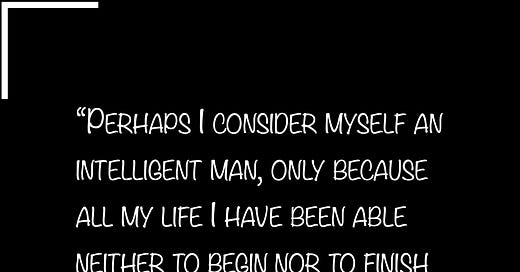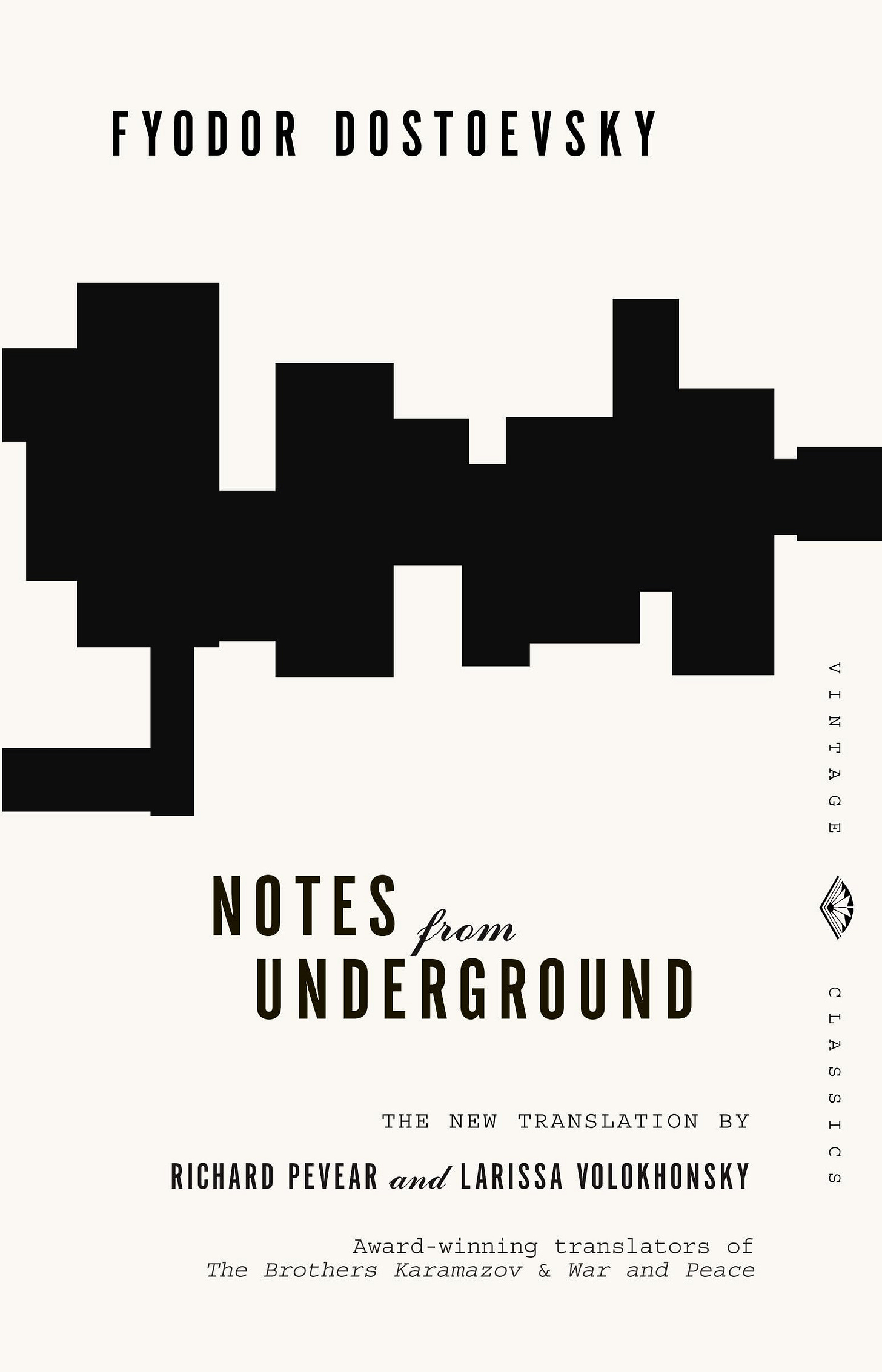Nuts and Bolts Review: Notes from Underground, Fyodor Dostoevsky
Unveiling the underground: how Dostoevsky’s masterpiece challenges modern rationality and redefines individual freedom
The Book
Notes from Underground (1864) is one of the earliest masterpieces by Fyodor Dostoevsky, a work that marked a turning point in European literature for its psychological depth and radical modernity. Written during a tumultuous period in Tsarist Russia, a time when social and political tensions were mounting ahead of major reforms like the 1861 abolition of serfdom, the book captures the atmosphere of alienation and disorientation in a society undergoing profound transformation. Dostoevsky, recently returned from exile in Siberia, was profoundly shaped by his years in captivity and his exposure to the nihilistic and utopian ideologies of the era—ideas he increasingly rejected with fervent conviction.
The unnamed protagonist, the “underground man,” is a modern antihero—a corrosive figure who becomes a symbol of the individual’s crisis in modernity. Through his fragmented and often contradictory monologue, Dostoevsky foreshadows existential and philosophical themes that would later influence writers like Nietzsche and Sartre. This “man of the underground” embodies a rebellion against the rationalism and optimistic determinism of the positivists of his time, revealing how pure rationality falls short of addressing the deeper needs of the human soul.
A short yet profound work, Notes from Underground is both a scathing critique of social utopias and an intimate confession of humanity’s darkness and complexity. Initially published in the journal Epocha, edited by Dostoevsky’s brother, the book invites readers to descend into the labyrinth of human thought, where logic and madness intertwine, leaving us without certainties but brimming with questions.
My Two Cents
Dostoevsky's Notes from Underground delves into the darkest mechanisms of the human mind, unveiling a central concept: the over-acute consciousness. This refers to an exaggerated self-awareness—hyper-rational and hypersensitive—that becomes incapable of moderating its own self-analysis, ultimately hindering the individual’s ability to act. Over-acute consciousness subjects every action to relentless self-criticism, making it nearly impossible to live fully or forge meaningful connections. Picture a mind so sharp, critical, and rational that it becomes its own prison—a consciousness that, by overanalyzing every detail and potential outcome, reflects a state of motionless dynamism. Dostoevsky describes this condition as a “disease” because it obstructs change, condemning those afflicted to a sterile existence defined by isolation and paralysis.
The paradox that emerges is that, precisely because of over-acute consciousness, along with the isolation and alienation it causes, a person endowed—or rather, cursed—with such a trait is fundamentally restricted in their experience of the world. They are preemptively hindered from engaging in experiences that, while imperfect, could contribute to a deeper understanding of themselves and the reality in which their self unfolds.
The individual endowed with over-acute consciousness is also referred to by Dostoevsky as "intelligent." Early in the book, he writes: “an intelligent man cannot become anything seriously, and it is only the fool who becomes anything.” This perfectly encapsulates the concept: only those deemed "stupid"—in direct opposition to the "intelligent," who are burdened with hypertrophied consciousness—are capable of becoming something because they prioritize experience, and the growth that stems from it, over self-criticism.
The "intelligent" individual, on the other hand, is paralyzed by the very rationality we typically consider a virtue, a hallmark of human experience compared to the animal. This rationality confines their engagement with the world, and therefore limits their capacity to grow into something. Over-acute consciousness makes it impossible to truly respect oneself as an individual; every action feels like a condemnation, and every potential change becomes something undesirable. It not only stifles transformation but erodes even the desire for it. As a result, the very act of beginning anything is perceived as utterly pointless.
The "intelligent" person—understood in Dostoevsky's terms—is condemned to remain an unchanging version of themselves. Dostoevsky himself articulates this bleak reality: “Perhaps I consider myself an intelligent man, only because all my life I have been able neither to begin nor to finish anything.” This is the voice of the underground, the core engine of immobility. It not only halts every process of transformation but also revels in its own stasis, justifying its inertia under the guise of intelligence.
If, however, we were to define intelligence as the ability to maximize the range of future actions (more on that here), a over-acute consciousness would reveal not intelligence, but rather dullness and narrow-mindedness—the very traits the underground ascribes to those it deems unintelligent.
This interplay of opposites is what should resonate with us. Both facets of our consciousness are essential for our growth as human beings. We must be introspective and reflective to draw the deepest lessons from our experiences, to know ourselves, and to internalize what we have lived. Yet to do this, we must first live. Living requires loosening the reins, breaking free from the constraints of perfectionism, acting even when it seems irrational, and experimenting even when it appears futile—or worse, counterproductive. Dostoevsky captures this paradox in a moment of clarity, identifying the ultimate advantage as the ability to act even against one’s own interest—the willingness to explore despite everything, trusting that valuable lessons can emerge precisely from those undesirable explorations.
At one point, the protagonist declares, “I am standing for ... my caprice, and for its being guaranteed to me when necessary.” This very caprice elevates the journey above the destination, the process above the outcome—an infinite pursuit that may never lead anywhere. Yet, paradoxically, it remains desirable, for it preserves individuality and safeguards the human spirit.
In Author’s Words
Quote n.° 1:
“It was not only that I could not become spiteful, I did not know how to become anything; neither spiteful nor kind, neither a rascal nor an honest man, neither a hero nor an insect. Now, I am living out my life in my corner, taunting myself with the spiteful and useless consolation that an intelligent man cannot become anything seriously, and it is only the fool who becomes anything. Yes, a man in the nineteenth century must and morally ought to be pre-eminently a characterless creature; a man of character, an active man is pre-eminently a limited creature.”
Quote n.° 2:
“I swear, gentlemen, that to be too conscious is an illness—a real thorough-going illness. For man’s everyday needs, it would have been quite enough to have the ordinary human consciousness, that is, half or a quarter of the amount which falls to the lot of a cultivated man of our unhappy nineteenth century.”
Quote n.° 3:
“My jests, gentlemen, are of course in bad taste, jerky, involved, lacking self-confidence. But of course that is because I do not respect myself. Can a man of perception respect himself at all? […] Can a man who attempts to find enjoyment in the very feeling of his own degradation possibly have a spark of respect for himself?”
Quote n.° 4:
“You know the direct, legitimate fruit of consciousness is inertia, that is, conscious sitting-with-the-hands-folded. […] All “direct” persons and men of action are active just because they are stupid and limited. How explain that? I will tell you: in consequence of their limitation they take immediate and secondary causes for primary ones, and in that way persuade themselves more quickly and easily than other people do that they have found an infallible foundation for their activity, and their minds are at ease and you know that is the chief thing. To begin to act, you know, you must first have your mind completely at ease and no trace of doubt left in it.”
Quote n.° 5:
“Oh, gentlemen, do you know, perhaps I consider myself an intelligent man, only because all my life I have been able neither to begin nor to finish anything. Granted I am a babbler, a harmless vexatious babbler, like all of us. But what is to be done if the direct and sole vocation of every intelligent man is babble, that is, the intentional pouring of water through a sieve? […] Oh, if I had done nothing simply from laziness! Heavens, how I should have respected myself, then. I should have respected myself because I should at least have been capable of being lazy; there would at least have been one quality, as it were, positive in me, in which I could have believed myself. Question: What is he? Answer: A sluggard; how very pleasant it would have been to hear that of oneself! It would mean that I was positively defined, it would mean that there was something to say about me.”
Quote n.° 6:
“What is to be done with the millions of facts that bear witness that men, consciously, that is fully understanding their real interests, have left them in the background and have rushed headlong on another path, to meet peril and danger, compelled to this course by nobody and by nothing, but, as it were, simply disliking the beaten track, and have obstinately, wilfully, struck out another difficult, absurd way, seeking it almost in the darkness. So, I suppose, this obstinacy and perversity were pleasanter to them than any advantage. Advantage! What is advantage? […] What if it so happens that a man’s advantage, sometimes, not only may, but even must, consist in his desiring in certain cases what is harmful to himself and not advantageous?”
Quote n.° 7:
“One’s own free unfettered choice, one’s own caprice, however wild it may be, one’s own fancy worked up at times to frenzy—is that very “most advantageous advantage” which we have overlooked, which comes under no classification and against which all systems and theories are continually being shattered to atoms.”
Quote n.° 8:
“You see, gentlemen, reason is an excellent thing, there’s no disputing that, but reason is nothing but reason and satisfies only the rational side of man’s nature, while will is a manifestation of the whole life, that is, of the whole human life including reason and all the impulses. And although our life, in this manifestation of it, is often worthless, yet it is life and not simply extracting square roots.”
Quote n.° 9:
“What does reason know? Reason only knows what it has succeeded in learning (some things, perhaps, it will never learn; this is a poor comfort, but why not say so frankly?) and human nature acts as a whole, with everything that is in it, consciously or unconsciously, and, even if it goes wrong, it lives.”
Quote n.° 10:
“Man likes to make roads and to create, that is a fact beyond dispute. But why has he such a passionate love for destruction and chaos also? Tell me that! But on that point I want to say a couple of words myself. May it not be that he loves chaos and destruction (there can be no disputing that he does sometimes love it) because he is instinctively afraid of attaining his object and completing the edifice he is constructing?”
Quote n.° 11:
“We are stillborn, and for generations past have been begotten, not by living fathers, and that suits us better and better. We are developing a taste for it. Soon we shall contrive to be born somehow from an idea.”
Resources
The book is available for free through Standard Ebooks here.





